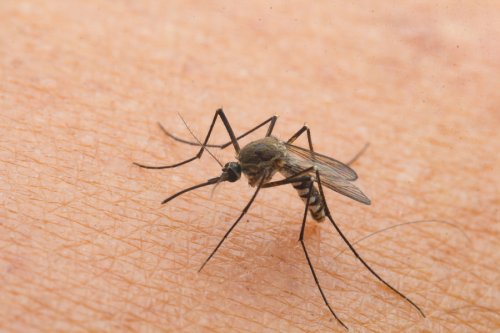Why Does My Child Always Get Bitten by Mosquitoes?

You go out for a walk and you can’t help noticing that many children are playing without being bothered by insects, whereas your child is pestered by them all the time. Why does my child always get bitten by mosquitoes, and others don’t? That’s a very good question, and we’ll let you know the answer below.
Mosquitoes are very active insects in warm climates. During the summer, it’s very common to get bitten by them. It’s a real concern for parents, especially if you’re away on vacation.
Unfortunately, children are a coveted target for mosquitoes. They frequently take advantage of outdoor activities to look for their “prey.”
As we said before, maybe you’ve noticed your child is always getting bitten by mosquitoes, and yet these very same creatures keep away from others. Well, it’s quite possible that your little one is a favorite target of these pesky insects.
It may not all be in your mind; mosquitoes could actually have a predilection for certain people for several reasons. Here we’ll explain the most common:
Why is my child always getting bitten by mosquitoes?
First of all, it’s important to know the reasons why your little one may be a mosquito’s favorite target. You’ll then be able to take the necessary measures to reduce the chances of getting bitten.
Blood type
Blood type is one of the biggest reasons for bites. Mosquitoes bite to feed and, like you, they have their preferences. When choosing a target, they’re inclined towards people with type O blood.
Their second choice are people with blood group B. People with blood group A are the lucky ones, bitten half as much as someone with blood group O.
How can mosquitoes know our blood type? Depending on our blood type, we secrete saccharides or sugars through the skin, and these serve as a chemical signal that mosquitoes are able to perceive. This is what tells them what our blood group is.

Physical activity
Mosquitoes are often attracted to the heat, and, when playing outside, a child’s body releases heat. This is not, however, the only thing they detect during our physical activity: they also detect sweat.
While playing, natural substances such as lactic acid, uric acid and ammonia come out in a child’s sweat. These are perceived by mosquitoes at a distance, and attract them.
It isn’t just a matter of hygiene though. Genetics play an important factor, and will determine how much of these substances their bodies will naturally secrete through their sweat.
Skin bacteria
A large number of bacterial species live naturally in our skin. Certain types, such as staphylococcus epidermidis, can attract mosquitoes. Bacteria don’t always work against us, though.
There are other bacteria called pseudomonas aeruginosa that appear to have the opposite effect to the ones mentioned above. They actually keep these insects away.
This interaction of attraction and repulsion with our skin bacteria makes them bite us more in specific areas such as ankles or feet. This is where we have the greatest concentration of germs.
“When choosing a target, mosquitoes are inclined to people with blood type O. Their second choice are people with type B”
Clothing
Mosquitoes aren’t only guided by smell, they’re also guided by their sight in trying to locate a suitable target. They can more easily detect dark colors such as black, navy blue or red.
Pastel shades, or light colors, such as white, help reduce the risk of getting bitten by mosquitoes. They also keep your child cool during outdoor play – especially, of course, in summer, when the heat is at its peak.
When your child returns home and has several red marks on different parts of his body, then he has most likely been bitten by mosquitoes.
Prevention measures against mosquito bites
If your child is always getting bitten by mosquitoes, don’t despair! You can ward off these unwanted insects by putting some easy tips into practice:
- Avoid dark or bright clothes, especially black and navy blue.
- Reduce outdoor activities at night, when the highest number of mosquitoes are around.
- Get rid of tanks with standing water at home, as they can encourage the proliferation of insects.
- Use mosquito nets on windows and doors, or even use ultrasound insect repellents.

Repellents, even though they’re a good option to protect children, should be used with care. You have to make sure you buy an effective and reliable product. There are also some natural remedies that can be used to repel mosquitoes.
Antimicrobial plants like sage or others like eucalyptus and cinnamon can keep them away if rubbed on the skin. Another very popular natural remedy is citronella, which we can buy in many different formats.
As a final recommendation, make sure you’re on the lookout for bad reactions to bites, to avoid infection and treat any allergic reaction.
If you see that the bites swell up, hurt a lot, or have pus, then go to the pediatrician as soon as possible. Do the same if your child develops a temperature as a result of the bite.
Follow our advice and stay safe and protected!
You go out for a walk and you can’t help noticing that many children are playing without being bothered by insects, whereas your child is pestered by them all the time. Why does my child always get bitten by mosquitoes, and others don’t? That’s a very good question, and we’ll let you know the answer below.
Mosquitoes are very active insects in warm climates. During the summer, it’s very common to get bitten by them. It’s a real concern for parents, especially if you’re away on vacation.
Unfortunately, children are a coveted target for mosquitoes. They frequently take advantage of outdoor activities to look for their “prey.”
As we said before, maybe you’ve noticed your child is always getting bitten by mosquitoes, and yet these very same creatures keep away from others. Well, it’s quite possible that your little one is a favorite target of these pesky insects.
It may not all be in your mind; mosquitoes could actually have a predilection for certain people for several reasons. Here we’ll explain the most common:
Why is my child always getting bitten by mosquitoes?
First of all, it’s important to know the reasons why your little one may be a mosquito’s favorite target. You’ll then be able to take the necessary measures to reduce the chances of getting bitten.
Blood type
Blood type is one of the biggest reasons for bites. Mosquitoes bite to feed and, like you, they have their preferences. When choosing a target, they’re inclined towards people with type O blood.
Their second choice are people with blood group B. People with blood group A are the lucky ones, bitten half as much as someone with blood group O.
How can mosquitoes know our blood type? Depending on our blood type, we secrete saccharides or sugars through the skin, and these serve as a chemical signal that mosquitoes are able to perceive. This is what tells them what our blood group is.

Physical activity
Mosquitoes are often attracted to the heat, and, when playing outside, a child’s body releases heat. This is not, however, the only thing they detect during our physical activity: they also detect sweat.
While playing, natural substances such as lactic acid, uric acid and ammonia come out in a child’s sweat. These are perceived by mosquitoes at a distance, and attract them.
It isn’t just a matter of hygiene though. Genetics play an important factor, and will determine how much of these substances their bodies will naturally secrete through their sweat.
Skin bacteria
A large number of bacterial species live naturally in our skin. Certain types, such as staphylococcus epidermidis, can attract mosquitoes. Bacteria don’t always work against us, though.
There are other bacteria called pseudomonas aeruginosa that appear to have the opposite effect to the ones mentioned above. They actually keep these insects away.
This interaction of attraction and repulsion with our skin bacteria makes them bite us more in specific areas such as ankles or feet. This is where we have the greatest concentration of germs.
“When choosing a target, mosquitoes are inclined to people with blood type O. Their second choice are people with type B”
Clothing
Mosquitoes aren’t only guided by smell, they’re also guided by their sight in trying to locate a suitable target. They can more easily detect dark colors such as black, navy blue or red.
Pastel shades, or light colors, such as white, help reduce the risk of getting bitten by mosquitoes. They also keep your child cool during outdoor play – especially, of course, in summer, when the heat is at its peak.
When your child returns home and has several red marks on different parts of his body, then he has most likely been bitten by mosquitoes.
Prevention measures against mosquito bites
If your child is always getting bitten by mosquitoes, don’t despair! You can ward off these unwanted insects by putting some easy tips into practice:
- Avoid dark or bright clothes, especially black and navy blue.
- Reduce outdoor activities at night, when the highest number of mosquitoes are around.
- Get rid of tanks with standing water at home, as they can encourage the proliferation of insects.
- Use mosquito nets on windows and doors, or even use ultrasound insect repellents.

Repellents, even though they’re a good option to protect children, should be used with care. You have to make sure you buy an effective and reliable product. There are also some natural remedies that can be used to repel mosquitoes.
Antimicrobial plants like sage or others like eucalyptus and cinnamon can keep them away if rubbed on the skin. Another very popular natural remedy is citronella, which we can buy in many different formats.
As a final recommendation, make sure you’re on the lookout for bad reactions to bites, to avoid infection and treat any allergic reaction.
If you see that the bites swell up, hurt a lot, or have pus, then go to the pediatrician as soon as possible. Do the same if your child develops a temperature as a result of the bite.
Follow our advice and stay safe and protected!
This text is provided for informational purposes only and does not replace consultation with a professional. If in doubt, consult your specialist.








